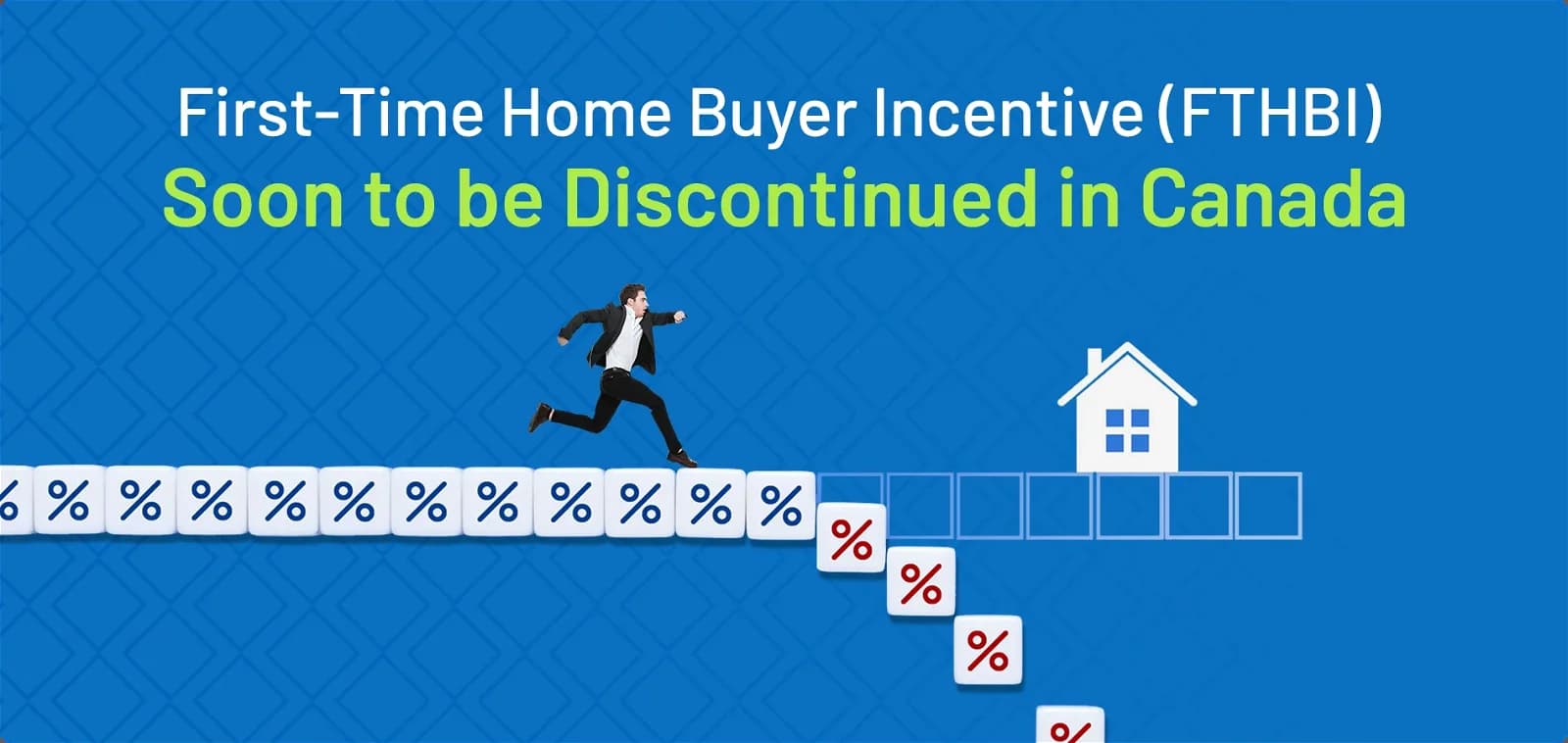Blog Search
Canada Govt. to End the First-Time Home Buyer Incentive (FTHBI) Program in March 2024

It's official, the First-Time Home Buyer Incentive program has now been discontinued in Canada as of March 1st 2024. Here are some key points from the CMHC website that you need to know before we jump into the details.
Deadline for new/updated applications: March 21, 2024 (midnight Eastern Time)
Deadline for manual review requests: March 25, 2024 (midnight Eastern Time)
No new approvals after March 31, 2024
Previously approved applications: Unaffected
The discontinuation of this program was already hinted at in the budget of 2022 where CMHC said that it will be extending the program till March 31st 2024. Little did we know at the time that the extension date would also be the last date for this program. To be honest, the program since the beginning was surrounded by criticism for various reasons and that is why the discontinuation for the most part is not surprising at all.
The 3 Main Reasons That Led to the Inevitable Downfall Of FTHBI
01Low Participation Rate
Initially budgeted at $1.25 billion to assist 100,000 homebuyers, the program fell short with only around 16,000 applications worth $285 million by March 2022. Criticism arose due to its low participation rate and limited impact on addressing housing affordability. Here is the maths of it.
Participation rate: The program had a participation rate of 16.00%. This means that only 16.00% of the targeted 100,000 homebuyers applied for the program by March 2022.
Budget utilization rate: The program only utilized 22.80% of its initial budget of $1.25 billion. This means that the total value of the applications received was $285 million, which is only 22.80% of the total budget.
Ratio of actual applications to target: The ratio of actual applications to the target number of applicants was 0.16. This means that for every 100 targeted homebuyers, only 16 applications were received.
These figures support the criticism that the program had a limited impact. The program fell short of its goals in terms of both the number of homebuyers it assisted and the amount of budget it utilized.
02Program Limitations
The FTHBI program had maximum purchase price limits for eligible homes. These limits were seen as insufficient in high-cost housing markets like Toronto and Vancouver. This essentially excluded many potential first-time homebuyers in these areas, as they couldn't find homes within the program's price range, further limiting the program's effectiveness in achieving its goal of helping first-time homebuyers in all regions of Canada. Although CMHC did raise the maximum purchase price limit specifically for the Toronto, Vancouver, and Victoria Census Metropolitan Areas (CMAs) its potential impact was still on the low side.
Just to give you an idea consider this comparison.
| FTHBI Maximum Purchase Price Limits (as of February 2024) | Average Home Prices in Canada (February 2024) |
|---|---|
| National: $480,000 | National: $847,800 [Canadian Real Estate Association] |
| Toronto CMA: $590,000 (introduced later to address concerns) | Toronto CMA: $1,354,000 [Wowa.ca Canadian Housing Market Report] |
| Vancouver CMA: $675,000 (introduced later to address concerns) | Vancouver CMA: $1,221,100 [Wowa.ca Canadian Housing Market Report] |
We can see a significant gap between the FTHBI purchase price limits, even with the adjustments for Toronto and Vancouver, and the actual average home prices in these cities.
Nationally: The FTHBI limit sits at 56.6% of the national average home price. This implies the program excluded a large portion of the market, even outside major cities.
Toronto: The adjusted FTHBI limit represents only 43.6% of the average home price in Toronto, highlighting the significant shortfall in addressing affordability challenges in this specific market.
Vancouver: Similarly, the adjusted FTHBI limit in Vancouver covers only 55.3% of the average home price, suggesting a limited impact on affordability in this market.
This comparison demonstrates the criticism faced by the FTHBI program regarding its insufficient purchase price limits, particularly in high-cost markets. The significant gap between the program's offerings and the reality of home prices likely contributed to its low participation rate and limited impact on addressing housing affordability, particularly in these areas.
03First Home Savings Account (FHSA) Is Better
CMHC themselves have stated that the first-time home buyer savings account introduced in April 2023 is a much better and more reliable tool for first-time home buyers entering the market. Because since its introduction over 500,000 Canadians have already opened an FHSA account it is safe to say that home buyers share this sentiment.
According to CMHC FHSA has the potential benefits compared to FTHBI.
Wider reach: The FHSA's broader eligibility criteria might allow it to reach more first-time homebuyers compared to the FTHBI's limitations.
Direct financial benefit: The FHSA allows individuals to save for their down payment without tax implications, potentially offering a more direct financial benefit for saving towards a home purchase.
Reduced market impact: As the FHSA doesn't involve government funds directly influencing the market, it might be seen as less likely to contribute to price inflation concerns compared to the FTHBI.
We highly recommend checking out our blog on FHSA where we cover what it is, how it works and who is eligible to know the full range of differences and benefits.
What Happens Next?

As of today, there is no official announcement from the CMHC or the federal government regarding a direct replacement program for the First-Time Home Buyer Incentive (FTHBI). However, as stated earlier the CMHC has indicated a shift in focus towards the First Home Savings Account (FHSA) as a more effective tool for assisting first-time homebuyers. Despite the absence of a direct replacement, the government is actively exploring multiple initiatives aimed at tackling housing affordability challenges in Canada.
Among these initiatives, the government is prioritizing investments in housing supply to enhance the availability of homes. This includes funding for new construction projects and measures to expedite approval processes. Additionally, programs such as the Rental Assistance Benefit aim to support low-income renters with their housing expenses. Furthermore, tax relief measures such as the Home Buyers' Tax Credit provide financial assistance to prospective homebuyers. While these efforts do not directly substitute the FTHBI, they underscore the government's ongoing commitment to addressing housing affordability concerns across the country, which at the moment is the best we can hope for.
Blog Search
Popular Blogs
Popular Blogs
The trademarks MLS®, Multiple Listing Service® and the associated logos identify professional services rendered by REALTOR® members of CREA to effect the purchase, sale and lease of real estate as part of a cooperative selling system.

